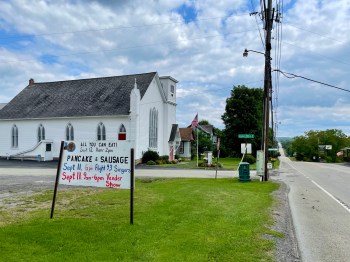More roads paved with private gold
TEXT OF STORY
BOB MOON: Have you noticed there’s a hot new investment out there? A decade ago it was telecom and Internet companies. Five years ago it was commercial and residential real estate. This year it’s public infrastructure that’s drawing the big money.
Yes, we mean socking your money away in bridges, tunnels and roads. They may look solid and boring, but in these volatile, troubled times, solid and boring is in — especially when it generates a decent return. As Marketplace’s Jill Barshay reports, states and cities around the country are happy to sell — even to foreign firms.
JILL BARSHAY: The Pennsylvania Turnpike is one of the oldest highways in the nation. It costs a lot to maintain. Last month the governor put the entire toll road — all 500 miles of it — on the market.
COMMERCIAL: The Pennsylvania Turnpike. We’ll make it a nice ride for you.
A Spanish road operator called Abertis — with a little help from Citigroup — offered the most: $5 billion in repair work plus a pile of cash: $12.8 billion.
ROY Kienitz: That will allow us to do thousands of bridge repairs, and hundreds of miles of road construction, billions of dollars into public transit over a very long period.
Roy Kienitz is deputy chief of staff for Gov. Ed Rendell of Pennsylvania. Rendell’s a Democrat. But Kienitz says he’s turning to the private sector because public funding’s hard to come by.
Kienitz: The problem is the traditional way that roads and bridges have been funded in the United States has been through the gasoline tax. And in the current environment it’s just impossible to raise the gasoline tax. It is never going to happen.
If the deal goes through, Pennsylvania will rent out the turnpike for 75 years. In exchange for maintaining the road, Abertis gets to collect and keep all the tolls. At the end, the highway reverts back to the state.
Not everyone likes the idea. Unions worry about toll collectors and repair jobs. Drivers fret about toll hikes. Some citizens don’t like putting America’s landmarks into foreign hands.
Dennis Enright of the NW Financial Group analyzes privatization deals. He says they don’t make economic sense. He says cities and states could get the up-front cash they need on the tax-exempt bond market.
Dennis Enright: They could get 30 percent more money or have 30 percent lower user fees by doing it with public financing rather than private.
But local governments aren’t convinced. They’re inspired by the deal Chicago made in 2005. It leased the Skyway toll road for $1.8 billion. And Indiana leased its turnpike for $3.8 billion.
It’s not just roads. Chicago hopes someone will pay to lease its Midway Airport later this year. It might have some luck on Wall Street. Investors are pouring money into infrastructure funds run by Goldman Sachs, Morgan Stanley and Credit Suisse.
One of the biggest private equity firms, the Carlyle Group, recently raised $1.2 billion. Robert Dove is co-head of the fund. He loves infrastructure, especially now that the market is so volatile.
Robert Dove: It’s not got operational risk. It’s not got technology risk. It’s not got build-out risk. These are assets which are stable, proven, predictable, public benefit, essential service assets.
Dove tells investors to expect returns above 10 percent, much higher than corporate bonds.
More than $30 billion of Wall Street money is aimed at infrastructure. That wave of cash is putting pressure on politicians and public officials to hand the keys over to the private sector.
But Wall Street might get a shock when it finds out how long it takes to get an infrastructure deal done.
In Pennsylvania, the governor is still waiting for the state legislature to approve his highway sale.
I’m Jill Barshay for Marketplace.
There’s a lot happening in the world. Through it all, Marketplace is here for you.
You rely on Marketplace to break down the world’s events and tell you how it affects you in a fact-based, approachable way. We rely on your financial support to keep making that possible.
Your donation today powers the independent journalism that you rely on. For just $5/month, you can help sustain Marketplace so we can keep reporting on the things that matter to you.


















